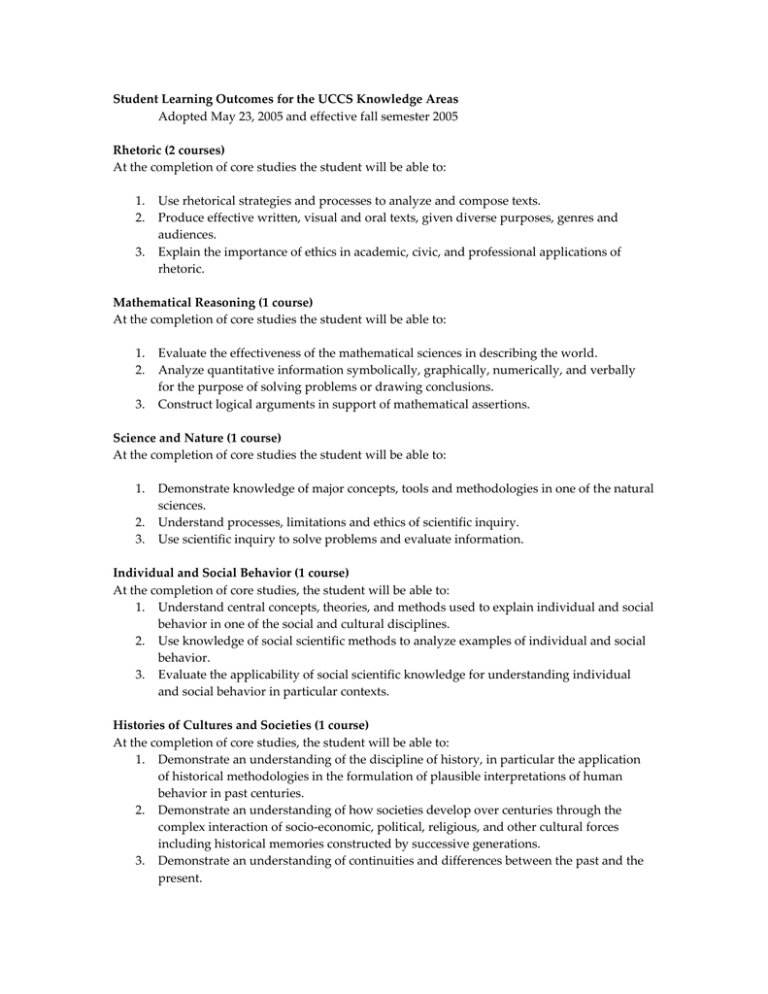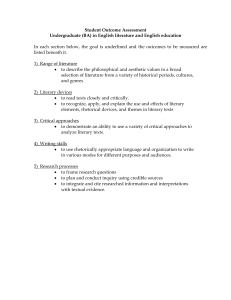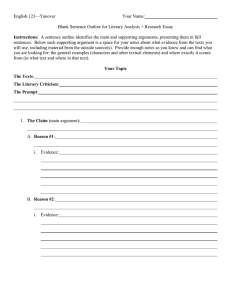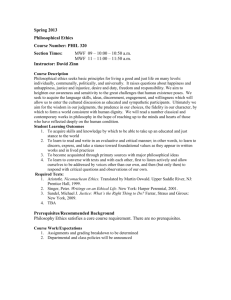Knowledge area learning outcomes
advertisement

Student Learning Outcomes for the UCCS Knowledge Areas Adopted May 23, 2005 and effective fall semester 2005 Rhetoric (2 courses) At the completion of core studies the student will be able to: 1. 2. 3. Use rhetorical strategies and processes to analyze and compose texts. Produce effective written, visual and oral texts, given diverse purposes, genres and audiences. Explain the importance of ethics in academic, civic, and professional applications of rhetoric. Mathematical Reasoning (1 course) At the completion of core studies the student will be able to: 1. 2. 3. Evaluate the effectiveness of the mathematical sciences in describing the world. Analyze quantitative information symbolically, graphically, numerically, and verbally for the purpose of solving problems or drawing conclusions. Construct logical arguments in support of mathematical assertions. Science and Nature (1 course) At the completion of core studies the student will be able to: 1. 2. 3. Demonstrate knowledge of major concepts, tools and methodologies in one of the natural sciences. Understand processes, limitations and ethics of scientific inquiry. Use scientific inquiry to solve problems and evaluate information. Individual and Social Behavior (1 course) At the completion of core studies, the student will be able to: 1. Understand central concepts, theories, and methods used to explain individual and social behavior in one of the social and cultural disciplines. 2. Use knowledge of social scientific methods to analyze examples of individual and social behavior. 3. Evaluate the applicability of social scientific knowledge for understanding individual and social behavior in particular contexts. Histories of Cultures and Societies (1 course) At the completion of core studies, the student will be able to: 1. Demonstrate an understanding of the discipline of history, in particular the application of historical methodologies in the formulation of plausible interpretations of human behavior in past centuries. 2. Demonstrate an understanding of how societies develop over centuries through the complex interaction of socio-economic, political, religious, and other cultural forces including historical memories constructed by successive generations. 3. Demonstrate an understanding of continuities and differences between the past and the present. Literature/Performing Arts (1 course) At the completion of Core studies, the student will be able to: 1. 2. 3. 4. Produce oral and written assessments of literary and cultural texts and/or performances using the language and concepts of one of these two knowledge area disciplines. Articulate how literary and cultural texts and/or performances can transform one’s understanding of self, others, and communities. LIT-specific outcome: Apply the methodologies of literary criticism to representative works of literature. PA-specific outcome: Engage with artistic expressions to understand the creative process. Human Nature and Ethics (2 courses) At the completion of core studies the student will be able to: 1. 2. 3. Assess views of human nature in various philosophical traditions, including classic Greek and Catholic philosophical traditions. Argue for one of the major ethical theories over another in terms of philosophical cogency and practical outcome. sUse philosophical reasoning to develop the student’s own position on central issues in human nature and ethics, for example, the relation between mind and body, the problem of freedom and determinism, the spiritual and affective dimensions of human life, the extent of human knowledge, the justification of moral judgments, and the elucidation of moral norms. Theology (2 courses) At the completion of core studies the student will be able to: 1. 2. 3. Describe theologically the basic content of the Catholic faith in relation to other Christian and religious traditions as well as other world views. Interpret theological texts and frameworks in their historical contexts. Articulate implications of Christian faith for growth in holiness and the promotion of justice in the contemporary world. Diverse Cultures (1 course) At the completion of core studies, the student will be able to: 1. 2. 3. Identify differences and similarities in communication, values, practices, and beliefs between one’s own culture and other cultures. Explain how categories of human diversity (such as race, gender, ethnicity, and disability) influence personal identities and can create structural and institutional inequity. Critically reflect upon one’s personal and cultural presuppositions and how these affect one’s values and relationships.





